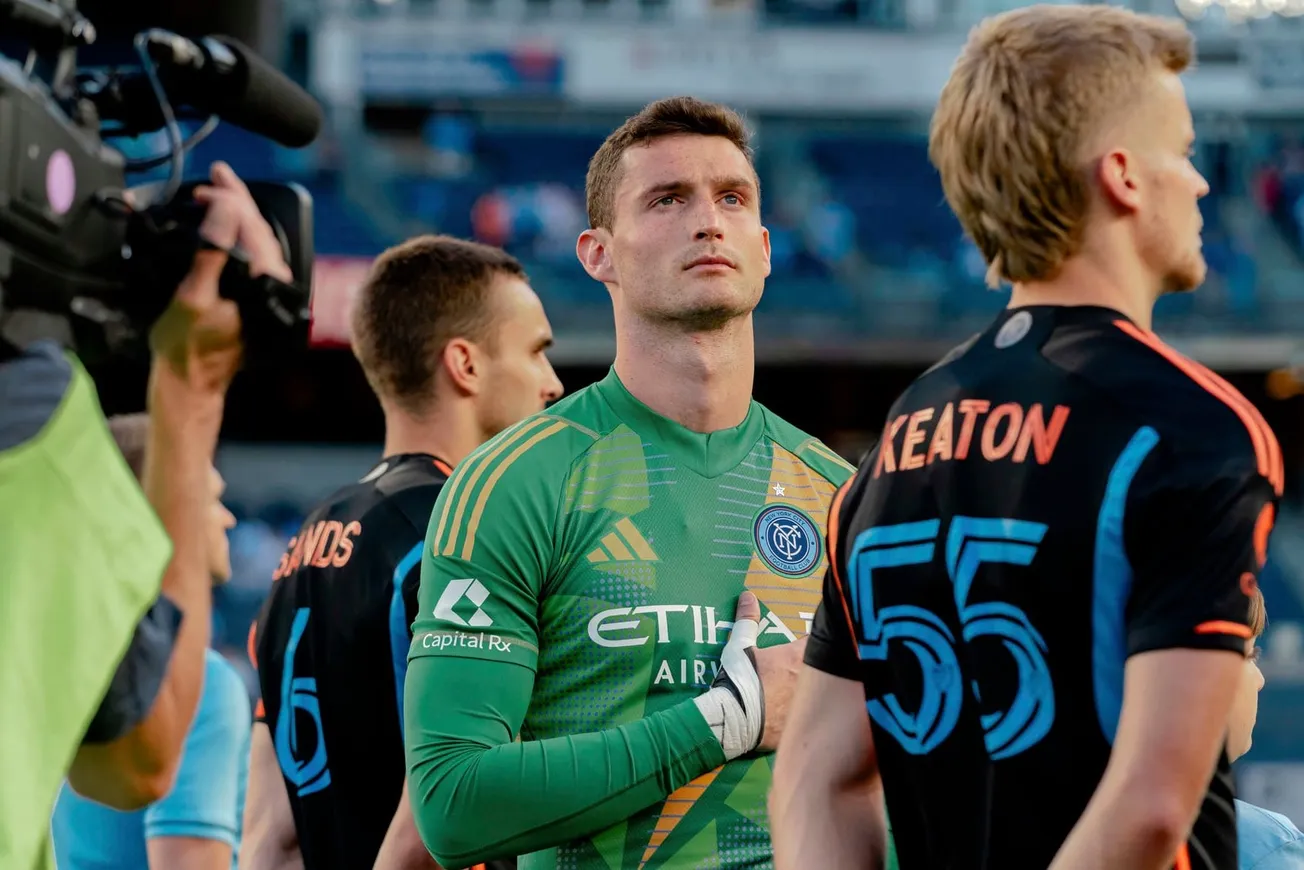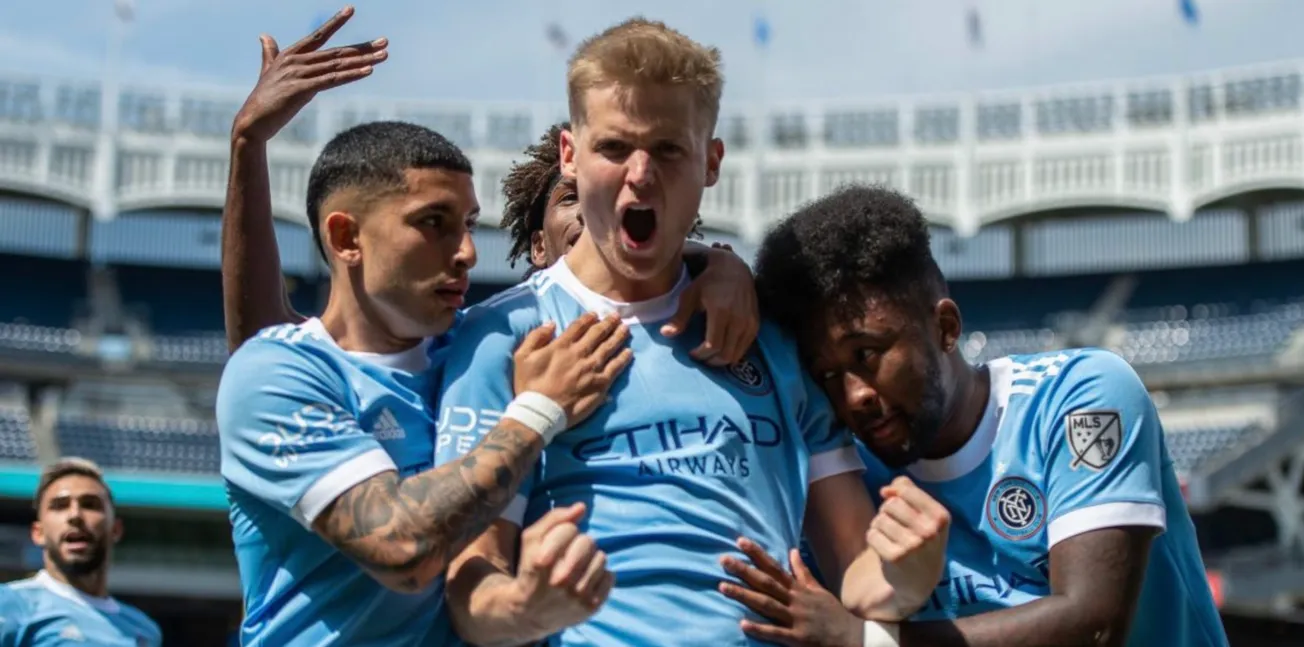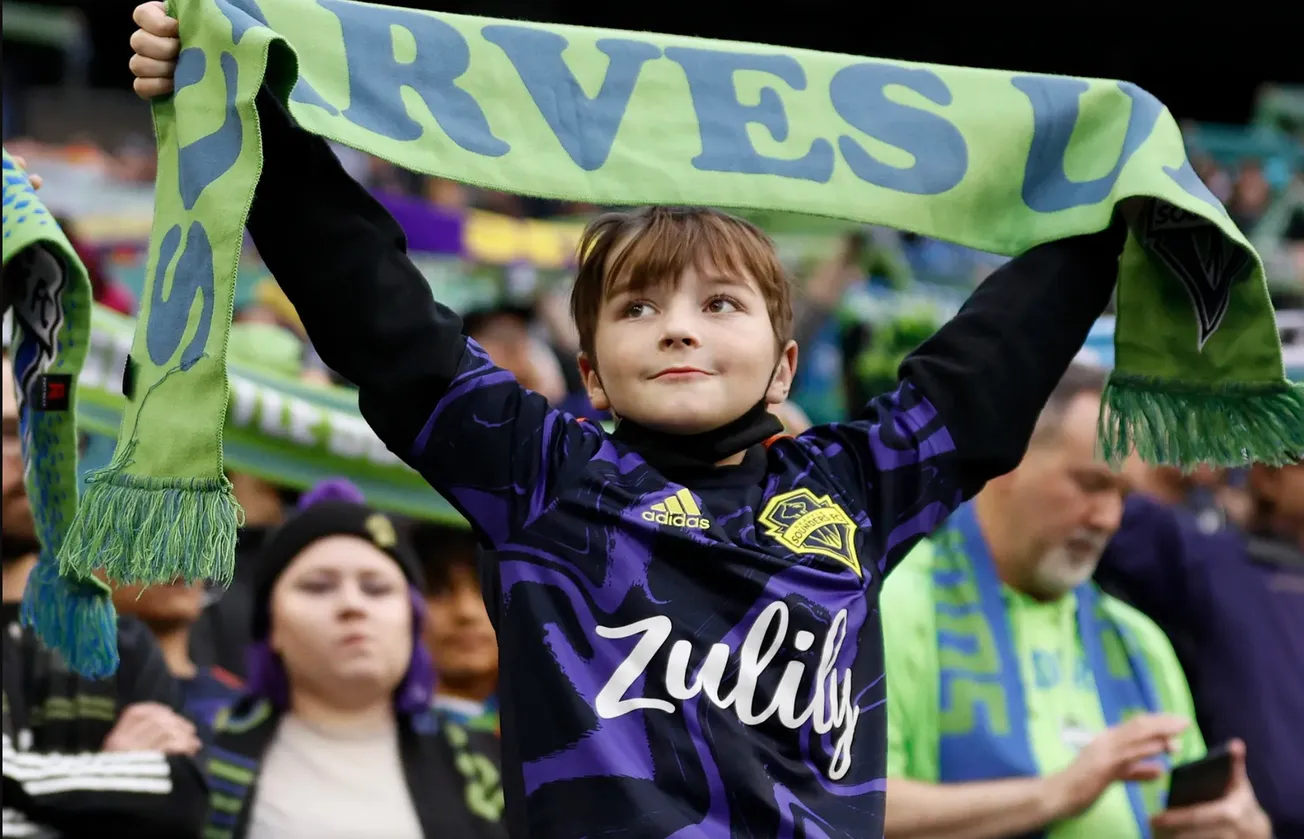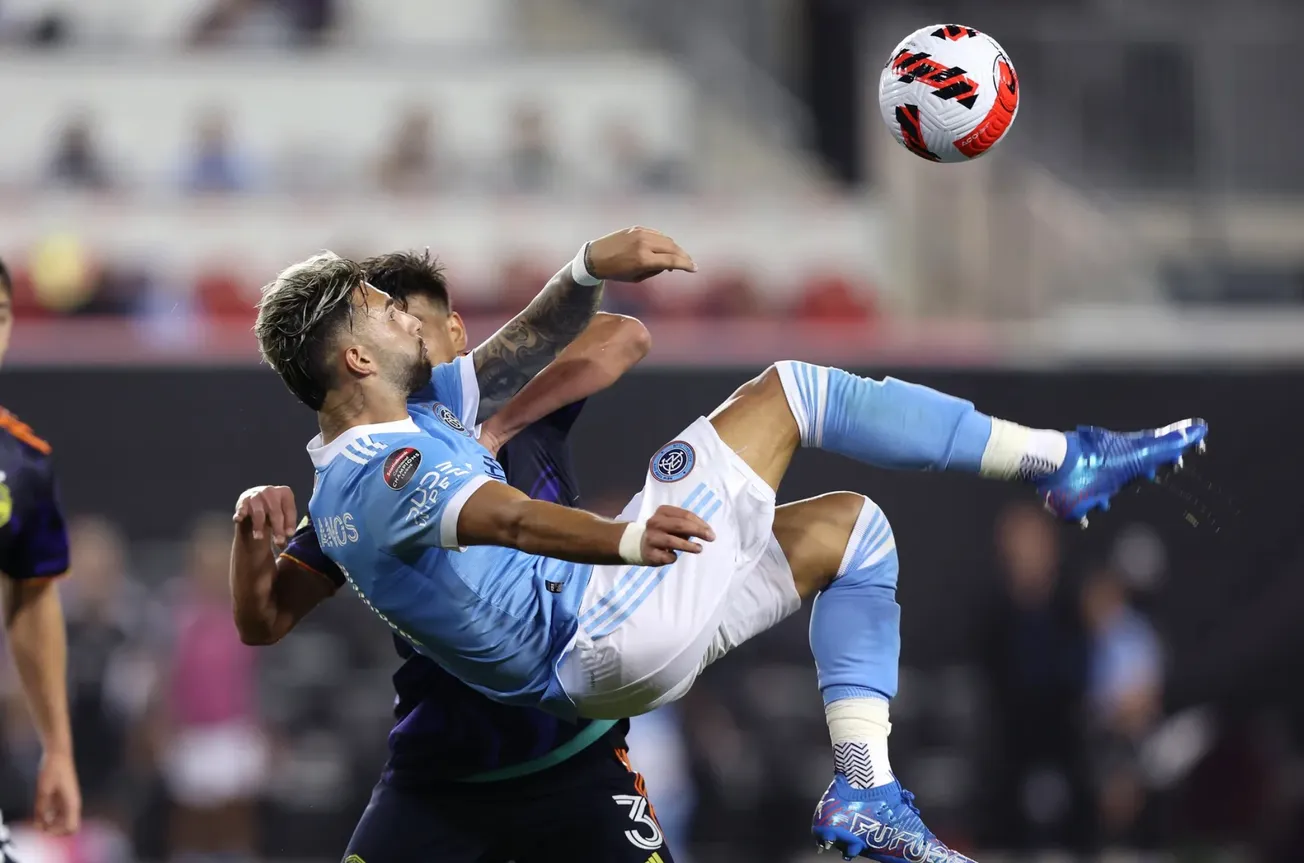You could see it in the composure of the New York City FC players when they took the field to face Real Salt Lake on Sunday: For the first time in more than four months, New York City didn’t have to think about the CONCACAF Champions League after losing to the Seattle Sounders last week by an aggregate score of 2-4.
NYCFC looked relaxed, loose, ready. Maxi Moralez was out with a rib injury, but it didn’t matter: Taty Castellanos headed in his first goal of the season in the ninth minute, then went on to score three more; Thiago worked two beautiful goals that gave us a glimpse of the potential he could unlock this year; and NYCFC rolled to a cathartic 6-0 win under the bright blue skies of a cold spring afternoon.
Later that day in the Pacific Northwest, Seattle lost to an inept Inter Miami FC at Lumen Field in front of an announced crowd of 32,126—Miami somehow scored, Seattle somehow couldn’t. Like NYCFC, Seattle were playing on short rest. Unlike NYCFC, Seattle started their benchwarmers and rested goalkeeper Stefan Frei, then desperately tried to salvage a point by subbing in the core of their best XI, including Albert Rusnák, Nicolás Lodeiro, and Rauál Ruidáz. It was futile: Some of the best players in MLS couldn’t break down a feeble Inter Miami.
Granted, Seattle took a redeye home Wednesday night, but even when you factor in the travel the two teams didn’t just post contrasting results over the weekend, they seemed to be on different trajectories: On the same day that NYCFC matched their biggest win in club history, Seattle suffered their most demoralizing loss of the year.
Yogi Berra once said that “baseball is 90 percent mental, the other half is physical.” That gem could be applied to just about every sport, especially soccer. The one-liner is more than just an aphorism. A study titled “Mental Fatigue and Spatial References Impair Soccer Players’ Physical and Tactical Performances” observed that mental fatigue has a significant effect on how the game is played. It concluded that mental fatigue “influenced the players’ ability to perceive and sustain their decisions based on the information from the environment, which resulted in different positioning and collective synchrony.”
In other words, mentally fatigued players have a harder time reading their teammates, the ball, and the field: A mentally fatigued team falls out of synch.
Interestingly, the study also found that mental fatigue has a negligible effect on physical ability. It observed that tasks might seem to be harder than they are, and are perceived to take more effort, but players can still perform as expected. It’s the decision-making that’s impaired.
This is just one study, and one very good quote, but it goes some way to explain the impact that the pressure of competing in a high-profile tournament like the CCL while simultaneously playing in league games can have on a team. When you have too much on your mind, your “positioning and collective synchrony” suffers.
For these past three months, NYCFC haven’t been playing like NYCFC. There was the compressed offseason, the punishing travel schedule, the games on short rest. Physically, the team looked good: Fast, fit, strong. Mentally, the team looked like a mess: Poor passes, misplayed give-and-gos, bad positioning. The cohesiveness of the team that comprehensively dismantled Atlanta United in the last year’s playoffs, then went on to grind out three gritty away wins on short rest, were nowhere to be seen.
New York City were mentally fatigued, and a mentally fatigued team falls out of synch.
To be honest, NYCFC never looked completely comfortable playing in the CCL. New York City seemingly started strong in the Round of 16, brushing aside Santos de Guapiles by a 6-0 aggregate, but that impressive scoreline papered over the problems preventing the club from finding its footing not just in the tournament, but in MLS as well.
The two wins over Santos were disjointed, more the product of individual flashes of skill overwhelming a weak opponent than a masterclass given by a team playing Champion-level soccer. They let NYCFC pad their resume, giving the team two wins and six goals—and let those who argued that 2022 was going as planned point to the numbers and ignore the quality of play.
That’s because what was happening on the field was ugly. NYCFC posted a 3-1 win over Comunicaciones FC in East New Haven in the first leg of the quarterfinals, but New York City couldn’t hold an aggregate 4-2 lead for 45 minutes of regulation time in the second leg. NYCFC’s mental lapses in the second half were shocking, none more than when 36-year-old midfielder José Contreras of Comunicacniones nailed a low shot from distance in the 88th minute that caught the entire New York City defense flat-footed. Goalkeeper Sean Johnson stood motionless in the middle of the goal, looking like he didn’t know the ball was in play.
We tend to fixate on the physical aspects of a game, and not the mental, because it’s easier to measure the distances covered or number of passes completed than the quality of the decision-making on the field. There is no xDM. Physically, NYCFC performed well: The team was healthy, and worked hard. Mentally, NYCFC performed atrociously.
That poor performance carried over to what would become a four-game losing streak. First, there was the 0-2 home loss to Philadelphia Union, when defensive gaffes gave away two goals, then there was the 2-1 away loss to Toronto FC, when a blown call took NYCFC’s head out of the game: Two winnable matches, two dispiriting losses. Finally, there was the first leg of the CCL Semifinals in Seattle, which the Sounders won 3-1 in no small part due to NYCFC’s mental lapses. Seattle’s second goal came from a quick throw-in that caught the NYCFC defense out of position (sound familiar?), and the third came from a poor challenge that gave away a penalty in the 68th minute. Seattle put in a magnificent performance that night, but it was NYCFC’s lack of focus that cost them the game.
The 3-1 loss made advancing to the CCL Finals improbable, and when Seattle scored in the first half of the second leg at Red Bull Arena last Wednesday night it became nearly impossible: NYCFC would have to score three to send it a penalty shootout, or score four to win. Game over.
It’s hard to say what manager Ronny Deila told the team in the locker room at halftime, but surely the players must have felt a burden lift from their collective shoulders. They didn’t have to worry about advancing in the tournament because they weren’t going to advance. And then a funny thing happened: NYCFC almost advanced.
As Yoda once said, “what you fear to lose, train yourself to release—let go of fear, and loss cannot harm you.” NYCFC released themselves from the fear of not advancing, let go of loss, and played 45 minutes of the most scintillating soccer seen in North America this year. Seattle won behind the goalkeeping heroics of Frei, but they were comprehensively outplayed by a fearless NYCFC that were displaying the coherence, spatial awareness, and positioning that had been absent at key moments in other games.
It was a frenetic second half. There was Thiago, using his footwork and speed to bring the ball into the box. There was Taty Casteallnos, drawing defenders to create space for Santiago Rodríguez and Talles Magno. There was Alexander Callens, running the ball into dangerous spots like an attacking center-back. There was Thiago Martins, calm under pressure. Too often this year NYCFC have underperformed against weaker teams, but that night an injury-depleted New York City thoroughly outperformed a full-strength Seattle. NYCFC were electric.
It was a draw that was a loss that felt something like a win: The score was 1-1 at the end, and Seattle advanced to the CCL Finals on 4-2 aggregate, but NYCFC had come out ahead in the 90 percent of the game that was mental.
Call it the Champions League hangover, call it the fear of losing, call it the fatigue caused by the mental overstimulation of preparing for high-stakes games while simultaneously grinding out league matches, call it trying to do too much at once—it’s gone. New York City are once again playing with purpose and clarity, and finding the “positioning and collective synchrony” they were missing.
NYCFC are back.









